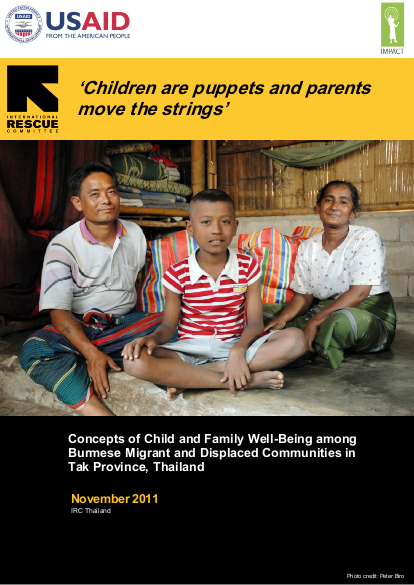
Thailand is home to an estimated 1.8 to 2.5 million migrants and displaced persons, of which the majority is of Burmese origin. Many Burmese migrants and displaced persons live and work in the northwestern province of Tak, a popular gateway from Burma to Thailand. The undocumented status of many Burmese migrants and displaced persons living in Tak province leaves them vulnerable to exploitation and marginalization. Children of undocumented Burmese migrants and displaced persons are particularly vulnerable to labor and sexual exploitation, as well as physical, sexual and emotional violence. In order to address the risks faced by Burmese children living in Tak province, the International Rescue Committee (IRC) received funding from the United States Agency for International Development (USAID) Displaced Orphans and Children Fund (DCOF) and World Learning to implement a comprehensive child protection project titled “Improving Mechanisms and Partnership for Action for Children in Thailand” (IMPACT). The project is designed to intervene at multiple levels of a child’s environment – from the family to the legal and policy environment – in order to maximize protection outcomes. The IMPACT project includes a family-based intervention that aims to improve family functioning, positive parenting skills, and child psychosocial well-being. In order to address the knowledge gap around family-based interventions in humanitarian settings, the impact of the intervention will be evaluated using a randomized controlled trial to assess changes in child and family indicators of well-being.
The purpose of this study is to use qualitative research with Burmese migrant and displaced children and families to understand culture and gender-specific definitions and indicators of child and family well-being, as well as identify protective processes and risk factors. Study findings would then be used to select and adapt a family-based intervention to ensure maximum cultural relevance and enhance family recruitment and retention. Findings would also be used to select, adapt or create culturally-tailored measures for the impact evaluation of the intervention. The study was conducted in four communities in Tak province during February and March 2011. In total, semi-structured interviews and focus group discussions were conducted with 10 community leaders, 55 adult caregivers, 48 key informants and 68 children.